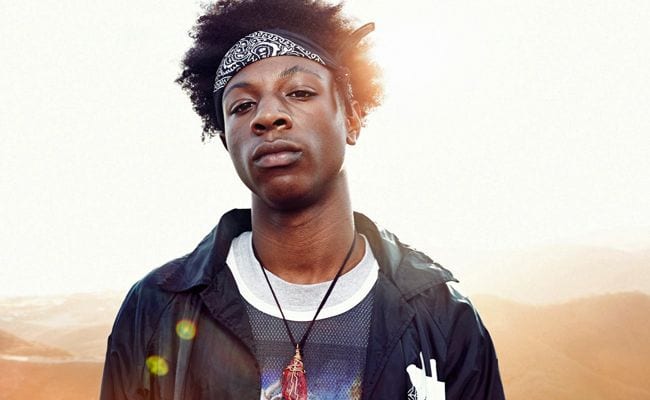
A music-critic pet peeve of mine is when a writer declares that a new album or song sounds exactly like some classic from the past, such that if you closed your eyes you wouldn’t know the difference. It’s never true. You can always tell the difference between soul-revivalists and a Motown or Stax classic, for example.
With Brooklyn rapper Joey Bada$$, though, it’s tempting to say such a thing. His music is so incredibly steeped in the sound of a very particular time and place: New York City, circa 1994-1995, with occasional forays around the East Coast and dips towards the later ‘90s . If I had the time and energy to do a track-by-track comparison, I could bring up at least a few mixtapes’ worth of songs from those particular 1994 and 1995 releases alone that are brought to the surface by something – an intro, a beat, an overall sound or even a vocal affection – on Joey Bada$$ debut album B4.DA.$$. (His “proper” debut, that is, after a few years’ of hot mixtapes.) In lyrics, he specifically mentions B.I.G. and ODB, but his songs are even more likely to go deeper into the hip-hop sounds of the time: Black Moon, Smif-n-Wessun, Jeru the Damaja, Mobb Deep, Showbiz and AG and more.
When the third track, “Paper Trail$”, begins, the music immediately calls to mind Gangstarr. You listen, a bit spellbound at how much it sounds like DJ Premier, and then you realize Premier in fact did produce the song. And that it’s right up there quality-wise among his productions, possibly even better than his outstanding contributions to last year’s PRhyme album. The other producers on B4.DA.$$, including Joey Bada$$’ ProEra compadres Statik Selektah, Kirk Knight, and Chuck Strangers, are clearly steeped in that same era and sound. Then there’s “Like Me”, with production credited to J Dilla and the Roots. There’s also “Escape 120”, where the beat goes almost drum ‘n’ bass, reminding me of the beat Questlove subtly segued into back in 1999 on “You Got Me”.
So Joey Bada$$ rolls within a climate of classic hip-hop, and a very purposeful one at that. All of this would amount to nothing if he wasn’t such a riveting MC — breathless and in control of it; intense but jokey; confident but not uncritical of that ego. His rhyming can seem like frantic, rapid-fire wordplay, but also deliberately paced at the same time. “Your favorite mellow schizo” is how he describes himself on “O.C.B.”; the idea of being mellow and schizophrenic at the same time seems so appropriate with respects to his approach on the mic. He has a very defined vocal style that has more range than at first appears — and perhaps more range than he’s shown in the past. Every few songs, he takes on a growling yet nasally tone that is somehow his most familiar, most retro vocal move, but also very alive.
Yes, every genre (and art form) has its retro-revivalists, its formalists, but the ones that matter are those that inhabit the role to such an extent that they breathe a new gust of wind through comforting styles. Joey Bada$$ does that on much of B4.DA.$$, to an even greater extent than on his acclaimed mixtapes 1999 and Summer Knights. He can use words that seem dated — do people call money greenbacks still? — or give a song a hook that sounds straight from a past era (“check my style / check check check it ouuuut”) and still make it seem fresh.
The album is strikingly similar in tone to the mixtapes; he’s not trying anything different, but rather continuing what’s worked well for him. But everything is more refined and better expressed; there are also songs that stand out more as anthems. “Christ Consciousness” is one; he turns rhyming with brutal abandon into a transcendental act. Another is “Black Beetles”, which channels both hip-hop’s martyr complex and Joey Bada$$’ capacity for wistfulness within braggadocio. That’s tapped too on “Like Me”, which seems like a love song, a get-high song, and a metaphor all at once, then sliding into barbed social commentary. Through the track’s repeated line, “that’s why we get high / say ‘fuck the police’” and his portrait of life within a warzone, he moves naturally into thoughts of freedom and individuality and justice.
Police brutality emerges as a quiet theme on the album; it feels both like a classic hip-hop trope, something MCs might have said in similar terms back in the ‘90s, and a reminder that Joey Bada$$ is making music now, in the world we live in today. The same is true when he rhymes about friends locked up and about best friends who’ve passed away. The way he operates, he’s always still linking those topics back up with hip-hop. The ghosts of 2Pac and Biggie, the legacy of Jay-Z and Nas… these things never seem far from his brain. The most moving track might be “On and On”, where he imagines a future day where he’ll fly up into the heavens to meet his idols. Yet he does so while still cracking sort-of jokes and strutting among his peers with swagger, which is the essence of Joey Bada$$. Even though his name seems antiquated and corny in a way, he betrays no signs that he cares if anyone thinks so.


![Call for Papers: All Things Reconsidered [MUSIC] May-August 2024](https://www.popmatters.com/wp-content/uploads/2024/04/all-things-reconsidered-call-music-may-2024-720x380.jpg)



